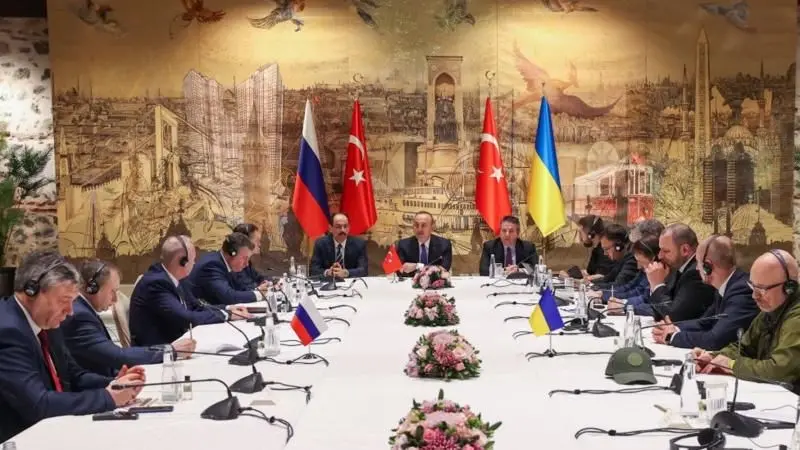Vadym Chernysh, Head of the Board of CENSS, joined the latest edition of the analytical platform “Analyze” as an expert, where, together with host Mykola Veresny and another expert, he discussed the topic of possible peace negotiations and the reasons why Ukraine has not been provided with long-range weapons.
Starting the conversation, journalist Mykola Veresny noted that recently there have been discussions within the so-called Russian opposition about an allegedly active negotiation process between Russia and Ukraine regarding potential peace terms. However, these discussions are not happening from the Ukrainian side. In this context, which seems more like a special operation, the journalist asked how seriously we should take such talks, as he believes there are no grounds to think about peace at this moment.
Here’s what Vadym Chernysh had to say on the matter:
“There is a difference between direct negotiations in the classic sense: when two delegations or contact groups come and talk to each other. The second scenario is when there are mediators—often self-proclaimed ones—who reach out to one side and offer their mediation services. Then they go to the other side and say, ‘I have a way to contact them, let’s talk.’ It’s worth noting that the Russians have been actively using this approach: since 2015, we’ve had about a dozen such mediators. But calling such things ‘serious negotiations’ is not accurate. However, I am convinced that there are contacts between states through serious mediators, but in other matters. For example, regarding the release of prisoners or illegally detained Ukrainians. But I’m confident that there are no main negotiations about how to achieve peace.”
The expert also noted that there could be negotiations on specific aspects, such as agreements like “you don’t strike energy facilities, and we won’t target bridges.” At the moment, there are several leaks from mediators about such talks. Vadym Chernysh also reminded that in any armed conflict, there are certain limitations. For example, during World War II, the Germans did not use poison gas. Additionally, commanders often agree on how to immediately retrieve the wounded and the dead after a battle. “Such negotiations, I think, do take place, although we will never fully learn their content,” the expert concluded.
Another issue discussed during the broadcast was why the West does not provide Ukraine with long-range weapons. One of the reasons for this is the West’s fear of provocations and sabotage carried out by Russian intelligence in Europe, which could significantly disrupt life for Europeans. How serious is this threat to Europeans? And what might such sabotage look like?
In response to this question, Vadym Chernysh explained that any threat is always compared to the resilience to that threat. And the resilience of the European continent to Russian sabotage is extremely low. Why are Europeans so afraid of Russian sabotage? “Because these could be attacks on infrastructure. Let’s remember those two cables in the Baltic Sea that were supposedly severed by a Chinese ship. But later it was found that there was a Russian crew on board that ship. They also have special forces, the so-called ‘Main Directorate of Deep Sea Research,’ which constantly creates threats to the infrastructure of Sweden and Norway. There have also been sightings of so-called ships near the shores of Spain and Portugal, where cables connect America with Europe. And the last point is people: Skripal, Litvinenko, the murder of the pilot who transferred a helicopter to Ukraine. There are also the various envelopes they send. They take this seriously, considering the weakness of counterintelligence and law enforcement in Europe,” the expert shared.
Vadym Chernysh also added that analysis from American intelligence agencies further highlights the need to compare the potential damage caused by weapons like the ATACMS or Storm Shadow. Perhaps there are so many of them that they won’t significantly change the situation on the battlefield, but the risk to Europe could be increased. This could lead to a decrease in European support for Ukraine and an increased desire to resolve the conflict at Ukraine’s expense.
_____________________________________________________________
Photo source: ВВС


